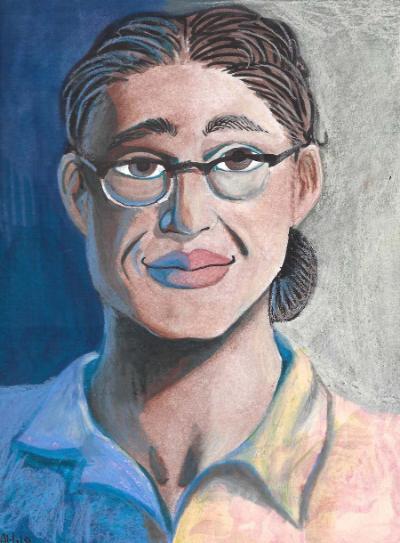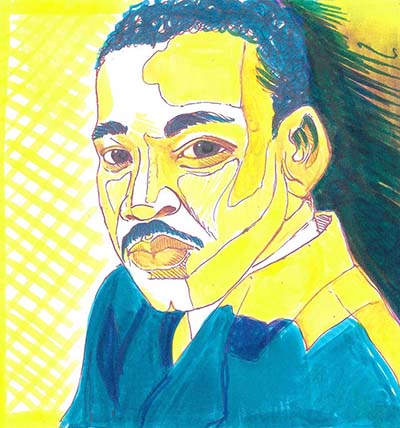Honoring Heroes of the Civil Rights Movement
by Madison Medeiros (Rosa Parks), Joe Thorpe (Martin Luther King, Jr.)
Rosa Parks
Recognized nationally as the “mother of the modern day civil rights movement” in America, Rosa Louise Parks created the stepping stones in activism for equality among the black community. Although Parks is most notorious for refusing to surrender her seat on the bus to a white male passenger on December 1, 1955 in Montgomery, Alabama, Parks was known for being an advocate against discrimination and racism.

Image: drawing of Rosa Parks (art by Atremis Hukalowicz)
During the 1930’s, Parks had worked on the celebrated case, “Scottboro Boys” and became a leading activist within her time. Parks and her husband, Raymond, were active members in the National Association for the Advancement of Colored People (NAACP). Parks served as a secretary and in later years would become a youth leader for the local branch.
After Parks had been arrested in 1995 for not giving up her seat, the black community living in Montgomery began protesting and boycotting the busses, which carried on for 381 days. Dr. Martin Luther King, Jr. happened to be a leading spokesperson for the Bus Boycott as well.
Parks’ courageous act, especially for a woman of color, prompted change within the country. Parks received many awards and medals such as NAACP’s Spingarn Medal, The Martin Luther King, Jr. Non-Violent Peace Prize, Rosa Parks Peace Prize in 1994, and even the Medal of Freedom, the highest ranking award a civilian may receive, granted by President William J. Clinton.
Parks went on to publish four books titled: My Story, Quiet Strength, I am Rosa Parks, and Dear Mrs. Parks; A Dialogue with Today’s Youth. She served as a role model to her community and the country, displaying dignity, determination, bravery and strength. Rosa Parks passed away on October 24, 2005 but her memory will continue to live on as a symbol of freedom, justice, and equality.
Martin Luther King, Jr.
An American Baptist minister from Atlanta, Georgia, a young Dr. Martin Luther King Jr. became a leader of necessity for the civil rights movement of the 1950s and 60s. He left high school a year early to attend attended Morehouse College and went on to receive his Ph.D. from Boston University.

Image: drawing of Martin Luther King, Jr. (art by Atremis Hukalowicz)
King advocated racial equality, anti-segregation in education, economic reform, social welfare, and protest to the Vietnam War through nonviolent activism and civil disobedience. King was the organized of marches across the South; he led men and women of all races in the Montgomery bus boycott, the Selma to Montgomery marches and organized the Southern Christian Leadership Conference and the Chicago open housing movement.
King was the inspiration to millions—to the world—to take a stand against injustice and oppression. King was the winner of the 1964 Nobel Peace Prize for combating racial inequality through nonviolent resistance, the Presidential Medal of Freedom, and the Congressional Gold Medal. King was assassinated by a single shooter, career criminal James Earl Ray, outside of his hotel room in Memphis Tennessee on April 4, 1968. The Martin Luther King Jr. Memorial is located next to the National Mall in Washington D.C., where there stands a carved statue of King, known as the stone of hope.
Martin Luther King Day, January 21st, was officially recognized as a federal holiday in 1986. That same world continues to be thrust into acknowledging injustice and racial inequality by King’s memory and his most iconic utterance, “I have a dream.” A dream of perseverance, a dream of unity, a dream that only dies when we let it—when the flame of freedom and hope is extinguished so goes King, so goes us, so goes America.
Categories: Featured, People